Trainings We Do
We do:
Classroom (in-person)
Online Trainings
* Each of these can be customized.
Our Trainings make You Employable.
Scroll down for full list


Visualization Concepts - General - Level 1
This training serves as an introduction to the fundamental principles and techniques essential for effective data visualization. Participants delve into basic concepts such as chart types, data encoding, and color theory, gaining a solid foundation in creating visually compelling and informative visualizations. Through hands-on exercises and practical examples, attendees learn to select appropriate visualization methods to represent different types of data accurately. They also explore the importance of storytelling through visualization to convey insights effectively to stakeholders. By the end of the training, participants are equipped with the skills to design clear and impactful visualizations that facilitate data-driven decision-making.
12 Hours of Learning; 1 Project Included

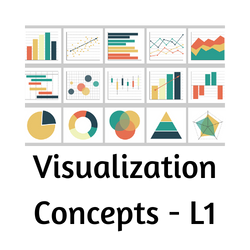
Visualization Concepts - Level 2 - by Function / Dept
Building upon the foundational knowledge from Level 1, this training delves deeper into advanced visualization strategies tailored to specific functional areas or departments within an organization. Participants learn to identify and address department-specific challenges through data visualization techniques optimized for areas such as marketing, finance, or operations. The training emphasizes the importance of understanding the unique data needs of each department and designing visualizations that provide actionable insights to stakeholders. Through case studies and real-world examples, attendees gain practical experience in applying advanced visualization techniques to solve complex business problems effectively. By the end of the course, participants are equipped with the expertise to create tailored visualizations that drive decision-making and business outcomes within their organization.
20 hours of Learning; 1 Project Included
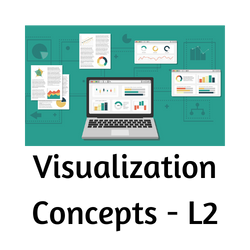

Tableau Desktop - Level 1
In this basic-level training, participants are introduced to Tableau Desktop, a powerful data visualization tool. They learn essential skills such as connecting to data sources, creating basic visualizations like bar charts and line graphs, and designing simple dashboards. Through interactive tutorials and guided exercises, attendees gain proficiency in navigating the Tableau interface and manipulating data to create insightful visualizations. By the end of the training, participants are able to leverage Tableau Desktop to analyze data effectively and present findings visually.
hours of Learning; __ projects included
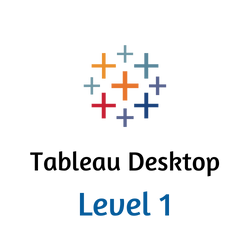

Tableau Desktop - Level 2
This intermediate-level training builds upon the skills acquired in Level 1, delving deeper into the advanced features and functionalities of Tableau Desktop. Participants explore topics such as calculated fields, parameters, and advanced dashboard design techniques. They learn to create more sophisticated visualizations, including dynamic dashboards with interactive elements like filters and tooltips. Through hands-on workshops and real-world scenarios, attendees enhance their proficiency in leveraging Tableau Desktop to visualize complex datasets and derive actionable insights. By the end of the training, participants are equipped with the skills to create dynamic and visually appealing dashboards that drive data-driven decision-making within their organization.
___ hours of Learning; __ Project Included
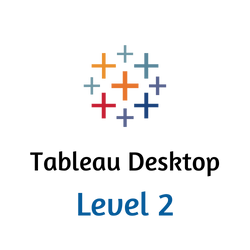

Tableau Server / Online - Level 1
This training introduces participants to Tableau Server and Tableau Online, platforms designed for collaborative analytics and sharing Tableau visualizations across an organization. Participants learn to deploy and manage Tableau Server or Online instances, including user management, permissions, and security settings. They explore features such as content management, scheduling, and data source connections, enabling them to facilitate seamless collaboration and sharing of insights within their organization. Through practical demonstrations and interactive exercises, attendees gain hands-on experience in setting up and configuring Tableau Server/Online environments. By the end of the training, participants are equipped with the knowledge and skills to effectively deploy and manage Tableau Server or Online, enabling efficient collaboration and sharing of insights across teams.
___ hours of Learning; __ projects included


Power BI Desktop - Level 1
This entry-level training provides participants with a comprehensive overview of Power BI Desktop, a leading business intelligence tool. Participants learn essential skills such as connecting to various data sources, transforming and cleaning data, and creating basic visualizations such as bar charts, line graphs, and pie charts. Through guided tutorials and interactive exercises, attendees gain proficiency in designing interactive reports and dashboards that facilitate data exploration and analysis. By the end of the training, participants are equipped with the skills to leverage Power BI Desktop to visualize data effectively and generate actionable insights that drive business decisions.
___ hours of Learning; __ Project Included
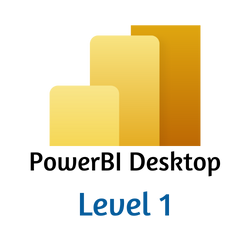

Databases (RDBMS and NoSQL)
This comprehensive training provides participants with an overview of relational (RDBMS) and non-relational (NoSQL) databases, covering their structures, querying languages, and use cases. Participants learn the fundamental concepts of database management systems, including data modeling, schema design, and normalization. They explore popular RDBMS such as MySQL, PostgreSQL, and SQL Server, as well as NoSQL databases like MongoDB and Cassandra. Through hands-on exercises and practical examples, attendees gain proficiency in writing SQL queries to retrieve and manipulate data from relational databases and understand the benefits and limitations of different database types for various applications. By the end of the training, participants are equipped with a solid understanding of database fundamentals and the skills to work with both relational and non-relational databases effectively.
hours of Learning; __ projects included
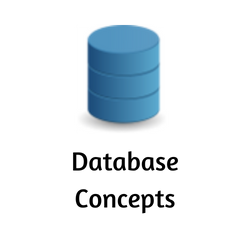

Data Storytelling (with multiple tools)
This training focuses on the art of data storytelling, teaching participants how to craft compelling narratives from data insights using various visualization and storytelling techniques. Participants learn to identify key insights from data analysis and translate them into engaging stories that resonate with stakeholders. Through hands-on workshops and case studies, attendees explore different tools and platforms for data storytelling, including Tableau, Power BI, and storytelling frameworks such as the Data Storytelling Canvas. By the end of the training, participants are able to combine data visualization with storytelling elements such as context, emotion, and narrative arc to create impactful data stories that inspire action and drive meaningful change within their organizations.
___ hours of Learning; __ Project Included


Data Analysts roles (Bundle)
This training explores the role of a data analyst, covering the responsibilities, skills, and tools commonly used in the field. Participants learn about the data analysis process, from data collection and cleaning to analysis and visualization. The training covers popular data analysis tools and programming languages such as Tableau, PowerBI, SQL, and more. Through case studies and real-world examples, participants understand how data analysts contribute to business decision-making and problem-solving across various industries. By the end of the training, participants have a clear understanding of the data analyst role and the skills required to succeed in this dynamic field.
hours of Learning; __ projects included


